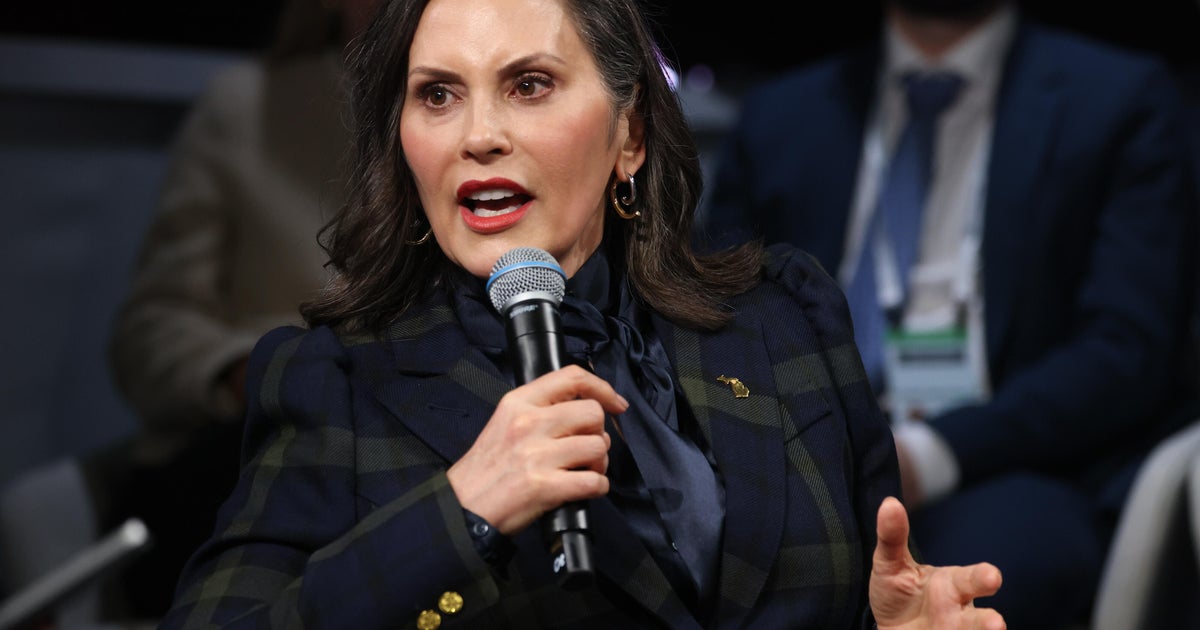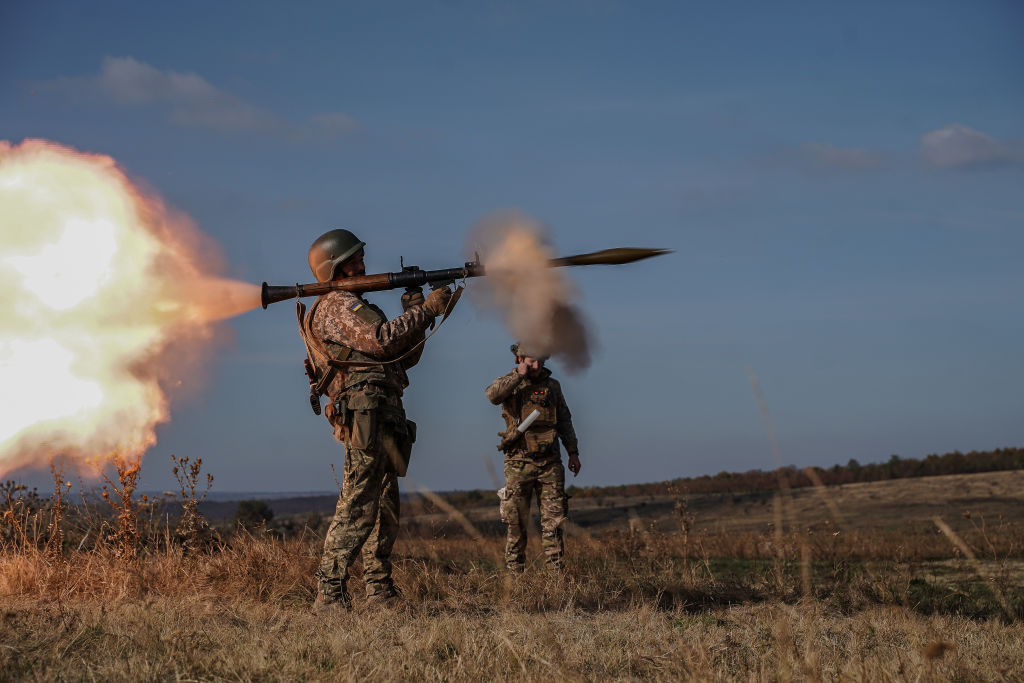Transcript: Deputy Treasury Secretary Wally Adeyemo on "Face the Nation," February 6, 2022
The following is a transcript of an interview with Deputy Treasury Secretary Wally Adeyemo that aired Sunday, February 6, 2022, on "Face the Nation."
MARGARET BRENNAN: Wally Adeyemo is the deputy treasury secretary of the United States, and he's here with me now. Good morning to you.
DEPUTY TREASURY SECRETARY WALLY ADEYEMO: Good morning, MARGARET.
MARGARET BRENNAN: As we've been talking about this latest intelligence shows Russia has all these forces mounted and could launch this large scale, full scale invasion. The impact would be huge in terms of refugee crisis and casualties. What would the impact of the global economy be?
DEPUTY SEC. ADEYEMO: So, MARGARET, I'm of course, not going to talk about the intelligence, but I want to talk about what we plan to do if Russia were to invade. When we started seeing Russian troops amassed near the Ukrainian border, the president asked Secretary Yellen and I to start having conversations with our allies in Europe to ensure that we would be in a place where we could launch economic sanctions against Russia if they were to invade. We have designed a set of economic sanctions that would take on the Russian financial system, limit President Putin's ability to project power into the future by cutting them off from key technologies and cutting off key elites from the Russian economy. To your question of what would be the impact on the global economy if Russia were to invade, we're already starting to see it. The Russian economy is already suffering from the- from the- from the moment that President Putin started to take these actions. The ruble is having the worst performance of- among- among emerging economies thus far this year. You're looking at their borrowing costs increase. And what we would see is we would see Russia's economy suffer if they were to take an action to invade Ukraine.
MARGARET BRENNAN: But what would the spillover be if you have a refugee crisis in the middle of Europe, if you have this kind of disruption? Does that spike energy prices? What does it do?
DEPUTY SEC. ADEYEMO: So, MARGARET, one of the things that we have done is we're working very closely with our allies in Europe to make sure that we're in a position to help meet their need for energy. A number of our colleagues have worked closely with them. We're also taking steps to prepare for a potential refugee crisis. But the key is the choice belongs to President Putin. He can make the choice of going down the route of diplomacy and dialogue with the United States and NATO. Or he can take the consequences of invasion, which will include severe economic consequences for his economy.
MARGARET BRENNAN: But how effective can U.S. and Western sanctions be if Russia is just going to move closer to China, as we're seeing?
DEPUTY SEC. ADEYEMO: So, MARGARET, I was in the Obama administration in 2014 when we took actions against Russia in response to their invasion of Ukraine. We've learned a great deal of lessons, and what I can tell you is the actions that we would take if Russia were to invade Ukraine this time would be far more significant. And it's up to President Putin if he wants to become dependent on China going forward. What I'll tell you is that China can't give Russia what they don't have. There are critical technologies that Russia is dependent on the United States and our allies on, technologies that Russia, that China does not have access to. Russian elites who we would cut off from the global financial system are not putting their money in China. They're putting their money in Europe and in the United States. And those elites, those who are helping President Putin make these decisions, we would cut them and their families off from the global financial system in ways that would limit their ability to do business in the ways they've done it in the past.
MARGARET BRENNAN: And that would, by putting pressure on the oligarchs and the elites, as you called them, around Vladimir Putin, you think that would put more pressure on Vladimir Putin than sanctioning him directly?
DEPUTY SEC. ADEYEMO: We think that the range of actions that we are prepared to take with regard to- with the United States and with Europe would have a significant impact on President Putin, on those close to him as well. When you think about it, the reason that we're taking actions with Europe is because, while on a daily basis Russian financial solutions do about $46 billion worth of financial transactions around the world, 80% of those transactions are in dollars. So they are connected to the US financial system. But their biggest trading partners are in Europe. More than $200 billion of trade is with Europe each year. Forty percent of Russia's trade is with Europe on a regular basis. By the United States and Europe acting together, we put ourselves in a position where we not only would have an impact on the overall Russian economy, but we'd have a direct impact on President Putin, who is tied to the Russian economy.
MARGARET BRENNAN: Right, well, Germany is very tied to the Russian economy. We know the German chancellor is sitting down with President Biden tomorrow. Are they the weakest link in this united front you're trying to forge? And Nord Stream Two and sanction, those seem to be inevitable at this point?
DEPUTY SEC. ADEYEMO: MARGARET, we've worked very closely with the German government. As you know, the new chancellor in Germany used to be the Finance Ministry, where I spent a great deal of time talking to his colleagues. And the Germans have worked with us closely in terms of building the sanctions package we would implement if Russia were to take these actions. They've helped produce ideas that are part of the things that we would implement to that point. What I can say about Nord Stream Two is that if Russia were to invade Ukraine, Nord Stream Two would never go online. In addition to working closely with Germany, we work closely with the EU and a design- designed a range of sanctions that would have significant impact on the Russian economy. It's important to, while we oppose Nord Stream Two, the key for us is making sure that we take far more significant actions in addition to Nord Stream Two in order to make sure the Russian economy suffers the consequences if Russia decides to invade. But as I've said, the choice belongs to President Putin. He can choose the path of diplomacy and dialogue or choose a path that leads to the Russian economy suffering not only for tomorrow, but suffering over the long term and limiting his ability to project power into the future.
MARGARET BRENNAN: China's incredibly fast growing economy. You're 13 months into this presidency. Why don't we have a Biden administration China strategy?
DEPUTY SEC. ADEYEMO: MARGARET, it's important to remember that China's economy is growing very fast. But China has had a very challenging last year in terms of their economy, and one of the things the president said was that he was going to focus initially on investing in the American economy and building relations with our allies. And that succeeded. The US economy has grown significantly faster over the last year than any economy in the world.
MARGARET BRENNAN: And so has inflation. So do you need to reconsider the tariffs on China in order to alleviate some of that inflation?
DEPUTY SEC. ADEYEMO: So, as you know, MARGARET, inflation is a global challenge. It's not only something that we face in the United States. It's something that Europe faces and the UK faces, and in talking to my allies and partners, the things that they tell me is that they are envious of the fact that we come at this challenge from a position of strength rather than weakness. Last year, as you know, the US economy created 6.6 million jobs and the economy grew faster than at any point in 40 years. And- but we do need to address high prices. It's something that impacts the American people, and the primary responsibility for doing that belongs to the Fed. And we believe in the Fed and the Fed's independence and chairman Powell has laid out a path for addressing this.
MARGARET BRENNAN: Right.
DEPUTY SEC. ADEYEMO: But the administration is also committed to doing what we need to do to address inflation from helping supply chains. And we've already started to see that the backlogs in the ports of Los Angeles and Long Beach have come down now that they're moving at 24- 24 hours a day. We're also starting to also see that companies are building up inventories because supply chains have gotten better. And you spoke about the jobs numbers that came out this month, which were historically high. But the most important thing to me was also that you saw a number of Americans who came back into the labor force, which- because when I talked to small businesses in the country, the CEOs,--
MARGARET BRENNAN: Yes.
DEPUTY SEC. ADEYEMO: —the biggest, one of the biggest challenges they face is they need employees, —
MARGARET BRENNAN: Right. It's- it's—
DEPUTY SEC. ADEYEMO: —so getting more people in.
MARGARET BRENNAN: Yes. It's a huge challenge we've been following on the program. Thank you very much, Mr Deputy Secretary, for your time today. We'll be right back.



